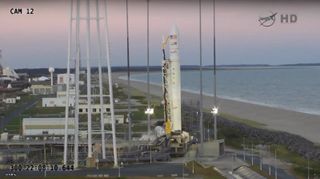
A private cargo spaceship was poised to make a gorgeous nighttime liftoff Monday (Oct. 27) visible to millions of people along the United States East Coast. But then a boat got in the way.
The unexpected presence of a boat downrange of NASA's Wallops Flight Facility on Wallops Island, Virginia, forced launch controllers to scrub Monday's planned liftoff of Orbital Sciences' unmanned Cygnus spacecraft, which was all set to blast off atop an Antares rocket at 6:45 p.m. EDT (2245 GMT) on a resupply run to the International Space Station.
The nighttime rocket launch is now set for Tuesday (Oct. 28) at 6:22 p.m. EDT (2222 GMT). Weather permitting, the launch could be visible for observers all along the U.S. East Coast, from as far north as Massachusetts and as far south as South Carolina, NASA officials said. [How to See the Nighttime Antares Rocket Launch]
You can watch a webcast of the launch live beginning at 5:30 p.m. EDT (2130 GMT) on Tuesday, courtesy of NASA.
Mission controllers tried repeatedly to contact the wayward boat that thwarted Monday night's launch attempt, but they could not get the boat to move in time.
"This was strictly a range issue this evening that terminated the count just 10 minutes before the scheduled liftoff time at the end of a 10-minute window," NASA commentator Rob Navias said during a webcast of the attempted launch.
Orbital Sciences executive vice president Frank Culbertson, a former NASA astronaut, congratulated launch team members for their work leading up to the planned liftoff and shrugged off the boat-caused delay.
Get the Space.com Newsletter
Breaking space news, the latest updates on rocket launches, skywatching events and more!
"That's just spaceflight," Culbertson said, adding that such things happen from time to time.
Cygnus is set to deliver 5,000 pounds (2,268 kilograms) of food, supplies and scientific experiments to the astronauts aboard the station. Virginia-based Orbital Sciences holds a $1.9 billion deal with NASA to make eight such supply runs and has already completed two of them.
NASA also signed a $1.6 billion contract with California-based SpaceX to fly 12 unmanned cargo missions to the orbiting complex. SpaceX has successfully completed three resupply flights using its Dragon capsule and Falcon 9 rocket.
Follow Mike Wall on Twitter @michaeldwall and Google+. Follow us @Spacedotcom, Facebook or Google+. Originally published on Space.com.
Join our Space Forums to keep talking space on the latest missions, night sky and more! And if you have a news tip, correction or comment, let us know at: community@space.com.

Michael Wall is a Senior Space Writer with Space.com and joined the team in 2010. He primarily covers exoplanets, spaceflight and military space, but has been known to dabble in the space art beat. His book about the search for alien life, "Out There," was published on Nov. 13, 2018. Before becoming a science writer, Michael worked as a herpetologist and wildlife biologist. He has a Ph.D. in evolutionary biology from the University of Sydney, Australia, a bachelor's degree from the University of Arizona, and a graduate certificate in science writing from the University of California, Santa Cruz. To find out what his latest project is, you can follow Michael on Twitter.
